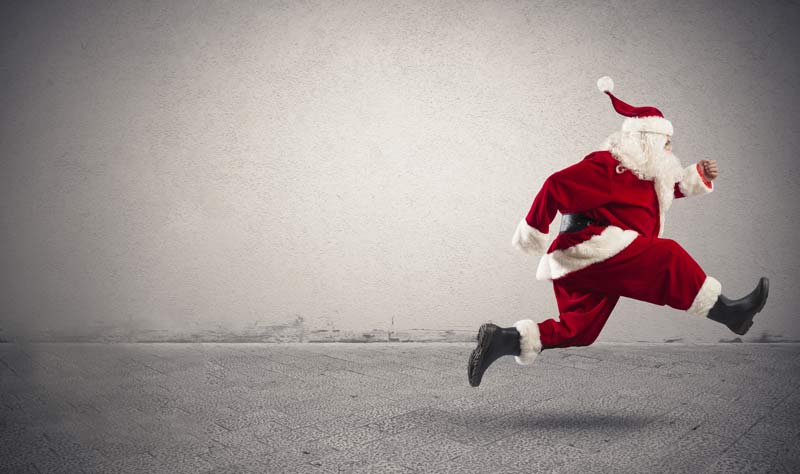
Christmas is great. You get presents, you see your family, you do fun stuff together, you eat nice food, and you get to relax. Everyone loves Christmas. But how can an athlete balance his or her training and diet over the festive period? It is a difficult question, but also a key issue – athletes and coaches are keen to maximize their adaptations from training and don’t want to miss a training session. Athletes who are competing indoors or in the cross-country season are likely to be both highly motivated to train and also anxious not to miss what are perceived to be important training sessions in the run up to their competitions. How can an athlete and coach balance the increased social demands and disruptions without wrecking all their hard work so far?
Do you actually need to train over Christmas?
The first question to consider is whether or not you need to train on Christmas Day? This year, Christmas falls on a Thursday, and for most people Thursday is a training day. Logic dictates that we should train on Christmas Day. There are many athletes who swear by the fact that they should train on Christmas. They see themselves as disciplined. Others think that it is a day where they can pull further ahead of their rivals who aren’t training on Christmas Day. Both arguments here are pretty illogical. Training on Christmas Day doesn’t make you more disciplined in general. There are 365 days in a year, and training discipline on the other 364 days is much more important than on the 25th December. Similarly, thinking that training on Christmas gets you ahead of your rivals is flawed thinking. One training session cannot make you into a World or Olympic Champion. Training is a process, with the sum greater than all of its constituent parts. The need for recovery is important, as is the need for mental down time. Training on Christmas Day can be stressful, as you have to find somewhere that is open and available to use, and also find time in the day. Finding time can be especially difficult if you are with the family, and they all have a plan or set routine. The increased stress of forcing a session on Christmas Day might not be worth it at all.

I’m not saying that athletes shouldn’t train on Christmas Day. By all means, if this is something you are used to doing, or enjoy doing, or even just really want to do, and then feel free to give it a go. What I am saying is that training on this day is not strictly necessary, and can be more hassle than it is worth. Added to the fact that Christmas falls at the end of three months of hard training, an additional few days off over this period might be beneficial.
If you do choose to train, please don’t post it all over social media as an illustration of how dedicated you are. It’s annoying, and other people are probably more dedicated than you on the other 364 days of the year.
Plan Ahead
The key to successful training over the Christmas period is planning. There will be multiple facility closures, so make sure you check the opening times of your usual training venue in advance. In the UK it is not that uncommon for training facilities to be closed for three days over Christmas, and also New Years Day. If you don’t want to have those four days off, then finding an alternative training venue is important. You might be able to get a guest pass for a different gym, or convince someone to come and open up the track for you and your training partners on a particular day.
The next thing to consider is travel. Many people travel to see relatives over the Christmas period, and so, should you wish, some level of organisation will be needed to ensure training is minimally disrupted. You will need to make sure that you pack any training kit you may need, as well as mobility stuff such as a foam roller and hockey ball. If you take supplements, it might be a good idea to take those too, unless you plan on having a few supplement clear days over the festive period (not necessarily a bad thing!).
Finally, once you know your travel plans and venue opening times, you and your coach should sit down together and come up with a Christmas schedule. Also remember to take into account your training partners travel and holiday arrangements, and try to come up with something that suits everyone; alternatively a few sessions training by yourself won’t hurt you. If you do want to train on Christmas Day, but are struggling to find a venue, anyone can do a tempo session in the park, or a bodyweight circuit at home. You just have to be prepared to compromise.
Build A Buffer
What with the venue and facility closures, travel and family arrangements, you might think it better to skip training on Christmas Day, and maybe even a few of the days over the whole festive period. I’m with you on that. One thing to consider here is building a buffer. It might be worthwhile doing some functional over-reaching in the lead up to your bonus few days off. This makes resting over Christmas positive and worthwhile and can make it easier for an athlete to accept the reduced training load / days off from a mental standpoint.
Similarly, athletes tend to worry (sometimes unnecessarily) over their diet. This can be especially tough over Christmas, with an abundance of cakes, chocolates and sweets available. A few days in the run up to Christmas where the athlete is strict with regards to their diet can make it easier psychologically to relax a bit on the big day. One of the worst things associated with being an athlete over the festive period are the immense feelings of guilt after eating a few too many chocolates or a second helping of Christmas pudding. Instead of having all these negative emotions, it is much better to build a diet buffer in the days leading up to Christmas, and then enjoy yourself on the day.
Diet
Ah, the Christmas diet issue. If you’re anything like me, you’ve spent a lot of your winter training period getting into reasonably good shape physically, and making sure your body composition is right. To achieve this, you have been eating a reasonably controlled diet, nothing too drastic, but obviously biscuits and copious amounts of chocolate are off the table. Then Christmas hits. What should you do? You know you have no will-power, and that massive family sized box of chocolates by the sofa looks so endearing. What about the big meals with your family, where grandparents push more and more food on your because you’re a “growing boy”? Or what about the higher number of Christmas parties you are invited to – how can you manage all of these without seeming like a social outcast?
The first thing is to remember my previous point; build a buffer. One day of a less than ideal diet is not going to ruin everything you’ve done so far. A week of chocolate and alcohol definitely will. By building into your schedule the fact that you’re going to eat a fair bit over Christmas, you can offset this eating by making sure your diet is how it should be before and after Christmas. Also, one day of high-calorie intake is potentially pretty good for you, depending on which nutritionists you listen to, as an influx of calories can up-regulate metabolism and make you feel much better. Having a day where you can just relax and eat what you like is also good from a psychological point of view so long as it doesn’t then spill over into Boxing Day and continue until New Year’s Day.

Food over Christmas also doesn’t have to be bad. There is an over-abundance of protein available in the form of turkey, or roast beef or pork. Eating protein increases satiety and could well stop you stuffing your face later in the day. By making sure that you consume protein with every meal, you are less likely to binge eat over the Christmas period. This includes breakfast – protein after a long overnight fast is a good idea. Most people struggle with getting protein in for breakfast, but eggs, or smoked salmon are great ideas.
There are also plenty of vegetables in a traditional Christmas dinner. Loading up your plate with these will make sure you get plenty of micronutrients (a good idea if you’ve forgotten your multivitamin), as well as a load of fiber. This fiber, like protein, will fill you up, making a trip to eat a whole cake from the door of the fridge much less likely (I’ve actually done this). Aim for a wide variety of vegetables, and pick low-sugar cranberry sauce for your condiment of choice – it’s likely to be higher in antioxidants than other sauces.
Christmas is also a good time to get plenty of healthy fats. Meat contains decent levels of fat, usually with a good amount of vitamins and minerals, so load up as much as you need. There also tends to be plenty of nuts lying around, and snacking on these can also be a good idea. Dark chocolate can also be useful – it’s hard to overeat because it is so bitter and contains plenty of antioxidants and polyphenols.
So what to avoid? Well, as an athlete you should moderate your alcohol intake if indeed you choose to consume any at all. Alcohol tends to be quite high in empty calories, and low in nutrients. It can also lead to poor decision-making, which further increases your chances of over-eating.
Hopefully, I have given you some good ideas for how to ensure that Christmas doesn’t have to ruin your training, diet and fitness goals. The main thing is to plan ahead and build a buffer, but always remember to enjoy yourself. Christmas is such a short period that missing training or cheating on your diet doesn’t matter. Instead, take the time to have fun and make the most of a few days off and seeing your family. Merry Christmas!
Since you’re here…
…we have a small favor to ask. More people are reading SimpliFaster than ever, and each week we bring you compelling content from coaches, sport scientists, and physiotherapists who are devoted to building better athletes. Please take a moment to share the articles on social media, engage the authors with questions and comments below, and link to articles when appropriate if you have a blog or participate on forums of related topics. — SF

